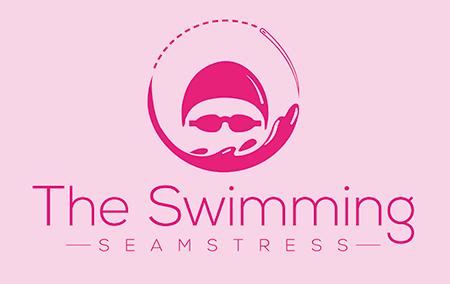“Nothing great is easy”
I remember the day I was invited to go to a swimming pool – not to muck about but to swim lengths – with a solo English Channel, multiple channel relay, hard-as-nails open water marathon swimmer. I swam 12 lengths. I was pretty damn chuffed with myself and left that pool thinking I had bossed the hell out of a swim. A few weeks later, the same swimmer took me for my first ‘proper’ sea swim – as in swimming out of my depth, away from the shore, past the groynes in Felixstowe, Suffolk. I swam for about 8 minutes and got sea sickness…..
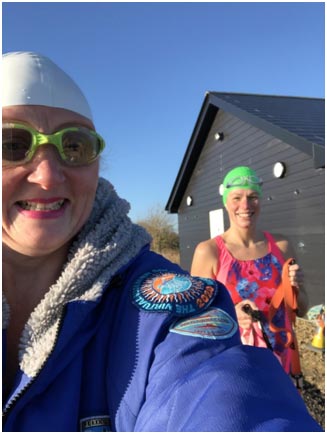
Louise Stratford, the legend, and I doing a bit of cold water swimming. I made her cozzie for her.
Fast forward 4 years later and I’ll tell you all about the time I swam to France with the most incredible bunch of swimmers, one beautiful day in September, 2021.
I was lucky enough to be selected for an English Channel relay team representing a Charity called Swim Tayka. This amazing organisation provides free swimming lessons and environmental education about clean water stewardship to underprivileged children who live along the earth’s open waters; rivers, lakes and oceans. So, not only was I tasked with being fit enough to swim, in the English Channel, day or night and in, potentially, frisky conditions, I also needed to raise at least £1.5 k for the Charity. Well, as Captain Webb said (first chap to swim the English Channel in 1875), ‘Nothing great is easy’.

L-R, Amanda, Sarah, Sophie, Claire, Lorna. Pre-Jonny joining. Training weekend in Dover.
How does one go about preparing for such an event? What are the key challenges to be considered and prepared for?
A channel relay works by a team of swimmers (5 in our case), taking turns to swim for an hour at a time on the same order of rotation throughout the swim. Starting on the shore in England and swimming until French shores are reached. Sounds simple doesn’t it. In essence it is. However, folk often have concerns. Many of which I have heard being discussed in training sessions in my own beloved Felixstowe and in Dover with the wonderful organisation which is Dover Channel Training. Here are a few of the most common topics that I came across and concerns I had myself. In no particular order;
Will I become hypothermic – can I handle the cold? The sea can be anything between 11 degrees and 20 degrees during the open water, English Channel swimming season. It’s not necessarily about the initial cold water shock when you enter the water. More so, about swimming comfortably for an hour, recovering and repeating this, possibly 2, 3,4 or more times during the course of a relay crossing.
Will I freak out swimming in the dark? It is very likely that some small or great part of the swim is going to take place in the pitch black. You swim when your boat pilot tells you to because they know when the most favourable conditions are going to occur. Night training is indescribably useful for preparing for dark times!
Will I be able to swim continuously for an hour, possibly 3, 4 or more times? Fitness and fortitude. You may think that you can predict how many times you will have to swim as part of your relay but the weather and tides can catch you out. You may do more or less swimming than you have trained for. Also, swimming in the dark or rough waters is more demanding so I trained for the worst case scenario, which I found to be very helpful.
Will I be disabled by sea sickness? The mightiest can be struck down by sea sickness. It’s miserable. In fact, swimming can be a welcome relief from the rolling and pitching of the boat and the constantly changing horizon which discombobulates the senses and can reduce the strongest swimmer to a miserable wreck. Sea sickness is also VERY dehydrating.
Will I get cramp and have to abort my swim? Anybody who has experienced cramp whilst swimming will recognise the overwhelming panic it can create when the muscles refuse to relax and the limb is rendered near to useless. This is something to be avoided as every swimmer knows that once cramp has reared it’s punitive head it threatens to linger.
Will I get attacked by jelly fish/sharks/seals/monsters etc? Yes, there can be monsters – in the mind, there can also be porpoises, seals, fish, jelly fish and man-eating seagulls. The friend, mentioned at the beginning, had to peel a jelly fish off of her face – which she described as annoying in her normal, understated fashion!
Will I have to swim through sewage? Folk have talked about refuse and dirty diesel water. I suggest this is where a bit of fortitude comes in handy as there isn’t really a lot that can be done about the condition of the water once one is swimming in it. The English Channel is pretty clean and the water is usually very clear,which can be a bad thing as it means you see any jelly fish or monsters.
Will I lose the boat or will the boat lose me? At some points during my swim I became very conflicted about my feelings towards the pilot boat. When I got too close to it during my hour swims I felt intimidated by the feeling the boat was lurching towards me and I was going to be crushed. On the other hand, being too far away from the boat enhanced the feeling of aloneness in the water, separated from the life line which is your boat and crew.
Will my goggles leak and I won’t be able to see/swim? Especially difficult when having to jump from the boat into open water. Goggles can get lost or knocked from your face creating the opportunity for naughty salt water to tease your eyes, dampen your vision and create a real problem for a sea swimmer.
Will I start throwing up in the water? Quite likely. Apparently the golden rule is to try and puke so the water carries it away quickly as opposed to getting sick-back in your face……nothing to add.
Will I be too slow? In other words, can the team maintain a pace that allows the pilot to work with the tide. Training to maintain a consistent pace, I have been told is key. Also being honest with your pilot about the speeds of your swimmers so they can plot a course accordingly.
Will my lipstick stay on? Apply, blot, apply, blot, apply, blot.
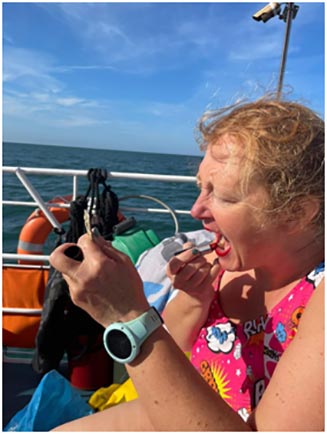
Keeping up appearances.
Will I get run over by a ferry? Not likely but it’s flipping frightening being in the water in close proximity to a container ship or ferry. The sense you are like a small pea in the presence of a massive, metal, powerful object can understandably create fear in the hardiest of swimmers. In reality, Dover Coastguard make frequent traffic updates and the ships in the Channel are all aware that there are small boats escorting crazy people swimming across their path, and they alter their course to avoid them; and sometimes coming out to the see the craziness!
There are probably more concerns than those listed but these are the common ones I have heard people speak about and some of which I have experienced myself.
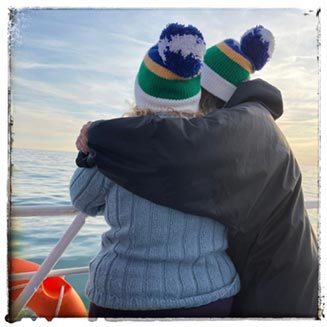
Sometimes you just need a hug from a team-mate, Sophie obliged.
What I will say about the open water swimming community is that folk are incredibly generous with their time and very warm hearted. It must be the effect that immersing yourself in cool water has on your soul. It somehow turns on a kindness response towards your fellow humans – particularly swimmers. I have been dressed, fed, rubbed with Vaseline (I wanted that to happen), guided through water in the pitch black, had socks put on my feet, had jelly babies lowered to me from the sides of kayaks, hugs when I have been upset and full of doubt, hugs when I have done well, hugs when I have been feeling chilly. I’ve had swimmers accompany me on training swims to keep me safe and motivated. I have been watched from the shore to make sure all is well. I have been challenged to push myself and I have been rewarded with praise, encouragement and constructive advice. What I have been given, in mind blowing quantities, is the confidence (borrowed from others at first) that there is absolutely no reason, whatsoever, why I shouldn’t be able to swim to France with my relay team. Oh my, my team, well that’s a whole other chapter.
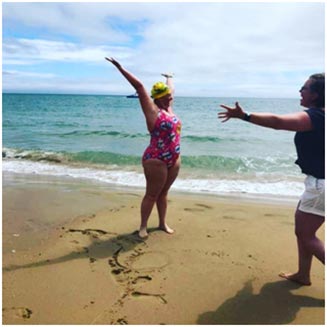
In-coming hug from Laura, after a 6 hour training swim during the Durley Sea Swimmers training week.
Part Two – The Swim
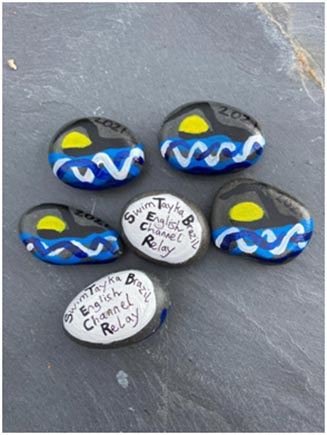
The best team mates. Claire painted good luck pebbles for us all.
Some of you may know that when you are undertaking a channel swim, you are given a ‘tidal window’ of about a week when you may be called at any moment, to be available in Dover, ready to swim. The pilots (folk who drive the support boat AND navigate – skilful and brilliant people) will consider the strengths and weaknesses of your team, the number of swimmers, the weather conditions, the strength of the tide and a heap of other things. They will also, simultaneously, be considering the 3 other swimmers or swim teams that you share your ‘tide’. Each window has four slots. Your pilot will then tell you when you are swimming. However, if the conditions are not favourable you don’t swim. You may miss your tidal window altogether. Then it’s a case of waiting for the right conditions to coincide with the availability of the team and a slot for the pilot to take you – then you are good to go. So, there we have it. Our magnificent team of 5 were prepared, ready and able but the tide god wasn’t on our side. We missed our window. In channel swimming circles this is known as taking a seat on the Dovercoaster – a roller coaster ride of mixed emotions, adrenalin draining, tiring, confusing pile of anticipation, excitement and, truth be told for me, a bit of foreboding. However, we got the call. Instead of swimming during the last week of August, Eddie Spelling, pilot of the boat Anastasia, asked us to meet him at Dover Marina at 1 am on Sunday, 12th September 2021.
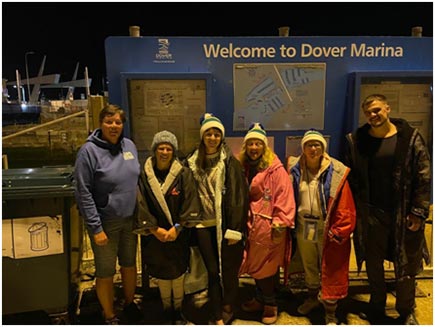
1 am, 12 September 2021 L-R, Lorraine (from Swim Tayka), Lorna, Sophie, Amanda, Claire and Jonny.
The water in Dover Marina is mirror like, calm, dark, shiny, enticing, alluring, and deceiving. It’s deceptive as once the support boat leaves the Marina you know, in your heart, you could be dealing with an entirely different set of conditions. That is precisely what happened to us. Off we went to Samphire Hoe in the pitch dark with the boat rolling and pitching, kit sliding on the deck, gripping to whatever we could. I suddenly had the awesome realisation that we were committed, we were going, we were swimming to France. Or so I thought. Sophie, swimmer one, simply an excellent human in all ways and a terrific swimmer, was all set to go, swimming costume on, vaseline applied (to stop chafing), guardian lights attached to her swimsuit and cap so we could see her in the water. Eddie our amazing, experienced, straight forward, no faffing about pilot appeared. ‘I’ve decided to take you back to Dover, it’s too dangerous to swim. We will see what the water is like in 6 hours and we can try again if the conditions are good’. We turned around. We went back to the Marina. We knew Eddie was right, we trusted him 100%. Nobody said a word.
In June 2021, I attended a Sea Swimming Training Camp organised by Durley Sea Swimmers. A brilliantly organised, supportive, challenging week with two bonus presentations. One of the talks was about resilience and I remember what the speaker said – it popped into my head on our way back to Dover. It’s called ‘flipping’ a situation. Purposefully find the positive in a challenging situation, flip the negative on it’s head. I flipped. I flipped thinking we would probably be swimming in daylight for the swim. We could have a rest and recover from the sea sickness. We would be swimming in calmer water. How excellent. I was relieved we had turned back. We arrived back at the Marina, Eddie appeared again. “I’ve decided we are going to hold on here for about 30 minutes. 3 other boats left after us and I want to see if they continue. If they do it means the water has calmed so stand down and don’t leave the marina”. I didn’t stand down, I lay down and went to sleep. The adrenalin and sea sickness had got the better of me and I needed to power down. I was gently nudged by my team mate Sophie some time later. ‘Mrs Bowden, wake up – we have to swim to France now’.
Want to find out more? Read the next chapter now >>
